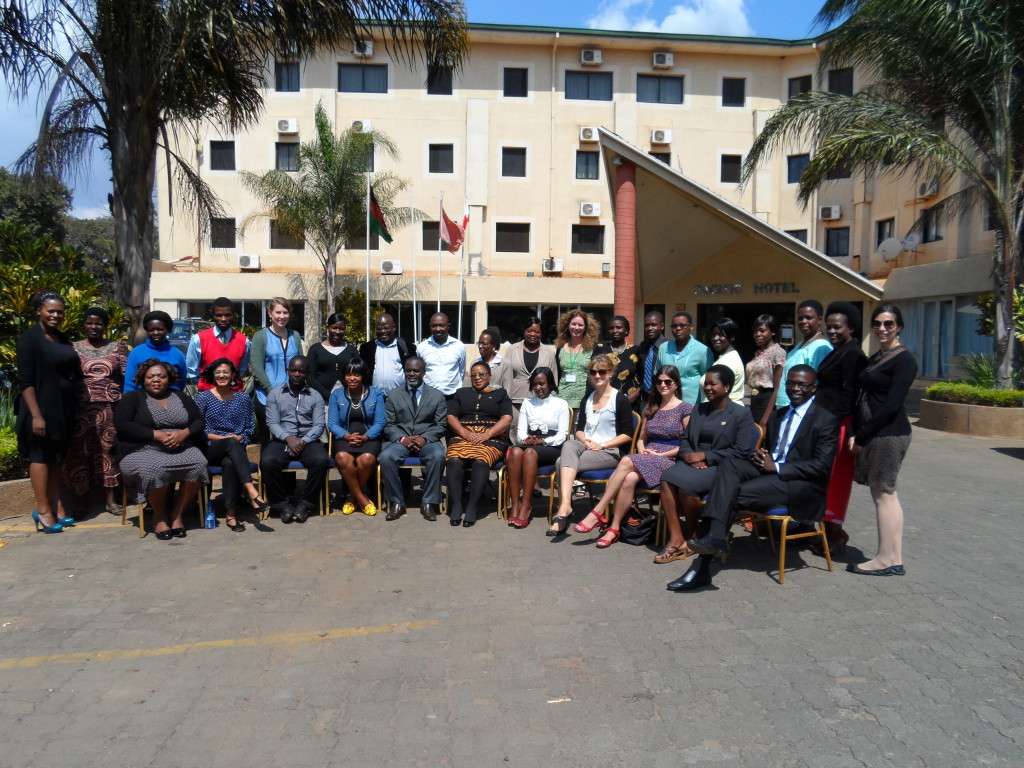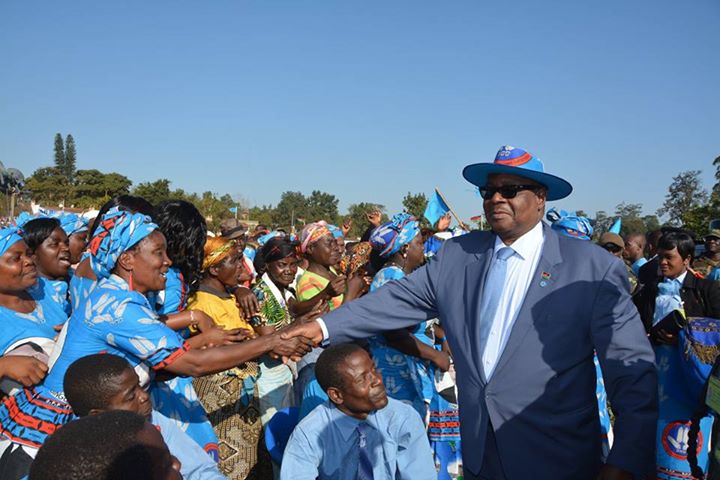Government has welcomed new evidence from the Hunger and Nutrition Commitment Index (HANCI) 2013 which ranks Malawi third in addressing under-nutrition and hunger.
The new finding were shared on Thursday during National Policy Dialogue on Hunger, Nutrition, and Climate Change organized by the Civil Society Agriculture Network (CISANET) and the Institute of Development Studies (IDS), University of Sussex of the United Kingdom (UK).
Principal Secretary for Nutrition, HIV and Aids Edith Mkawa said: “We believe that the findings by a reputable institution like IDS on the hunger and nutrition will help provide insights on how we can improve on our commitments to address the challenges of hunger and malnutrition.”
Mkawa pointed out that although there have been massive efforts to address challenges of hunger and malnutrition in the country, a lot needs to be done to overcome them.
“One major driver of malnutrition is poverty and also food insecurity. Currently more than half of the population still lives on less than US$1.25 per day and a quarter of the population is considered ultra-poor.
“Food insecurity still affects 21 of 28 districts in the country and around 20 per cent of the population suffers from chronic hunger. Additionally, Malawi still faces high rates of Vitamin A and Zinc deficiency up to greater than 20 percent and 40 percent respectively with levels of stunting, wasting and underweight among under-5 children among the highest in the continent,” she said.
CISANET National Director Tamani Nkhono-Mvula observed that it is widely accepted that climate change and poverty are two issues that are mutually reinforcing.
Commenting on women’s vulnerability, Nkhono-Mvula said women are more affected by climate change due to their roles of reproduction, production and also expected active roles in community development.
He added that poverty also makes households to be risk averse leading in most cases to production of low value food stuff meaning that any disturbance on smallholder productivity by climate change will have a direct effect on the nutrition status of most rural households.
“Any policy intervention on climate change and nutrition should address the gender factor for it to be more effective. The project done by CISANET and IDS tried to bring out this conceptual linkage and how effective policies on climate change, food security and nutrition can be effectively designed.
“The National Nutrition Policy and the National Food Security Policy are somehow lacking in address this conceptual linkage. We need to ask ourselves as to how can we make these two policies more gender and climate sensitive,” said Nkhono-Mvula.
The policy dialogue on hunger, nutrition and climate change was also attended by the representative of other government departments, the Coalition of Women Farmers (COWFA), the civil society and Non-Governmental Organisations (NGOs) and the donor community.
On the HANCI, Malawi has slid one position from second in the 2012 ranking. In the 2013 HANCI rankings, Guatemala claims top spot for the second year in a row; however competition for HANCI’s top spot is heating up. Guatemala is closely followed by Peru.
HANCI compares 45 developing countries for their performance on 22 indicators of political commitment to reduce hunger and under-nutrition. All the countries compared in the index have high rates of hunger and under-nutrition. The comparative approach of the index means that country scores are calculated in relation to the political commitment of the other countries in the index.
According to the report, Malawi is one of the few countries which meet its commitments agreed within the African Union’s Maputo Declaration, to spend over 10 per cent of public expenditure on agriculture (28.9%).
The key findings of the 2013 Hunger and Nutrition Commitment Index show that some low ranked countries are demonstrating a clear improvement in commitment but others appear to be going backwards. Guinea Bissau, Sudan and Myanmar languish at the bottom of the rankings.
But despite the strong performances in a number of areas, the report has also cited areas that need attention. The report points out that the
Government has welcomed new evidence from the Hunger and Nutrition Commitment Index (HANCI) 2013 which ranks Malawi third in addressing under-nutrition and hunger.
The new finding were shared on Thursday during National Policy Dialogue on Hunger, Nutrition, and Climate Change organized by the Civil Society Agriculture Network (CISANET) and the Institute of Development Studies (IDS), University of Sussex of the United Kingdom (UK).
Principal Secretary for Nutrition, HIV and Aids Edith Mkawa said: “We believe that the findings by a reputable institution like IDS on the hunger and nutrition will help provide insights on how we can improve on our commitments to address the challenges of hunger and malnutrition.”
Mkawa pointed out that although there have been massive efforts to address challenges of hunger and malnutrition in the country, a lot needs to be done to overcome them.
“One major driver of malnutrition is poverty and also food insecurity. Currently more than half of the population still lives on less than US$1.25 per day and a quarter of the population is considered ultra-poor.
“Food insecurity still affects 21 of 28 districts in the country and around 20 per cent of the population suffers from chronic hunger. Additionally, Malawi still faces high rates of Vitamin A and Zinc deficiency up to greater than 20 percent and 40 percent respectively with levels of stunting, wasting and underweight among under-5 children among the highest in the continent,” she said.
CISANET National Director Tamani Nkhono-Mvula observed that it is widely accepted that climate change and poverty are two issues that are mutually reinforcing.
Commenting on women’s vulnerability, Nkhono-Mvula said women are more affected by climate change due to their roles of reproduction, production and also expected active roles in community development.
He added that poverty also makes households to be risk averse leading in most cases to production of low value food stuff meaning that any disturbance on smallholder productivity by climate change will have a direct effect on the nutrition status of most rural households.
“Any policy intervention on climate change and nutrition should address the gender factor for it to be more effective. The project done by CISANET and IDS tried to bring out this conceptual linkage and how effective policies on climate change, food security and nutrition can be effectively designed.
“The National Nutrition Policy and the National Food Security Policy are somehow lacking in address this conceptual linkage. We need to ask ourselves as to how can we make these two policies more gender and climate sensitive,” said Nkhono-Mvula.
The policy dialogue on hunger, nutrition and climate change was also attended by the representative of other government departments, the Coalition of Women Farmers (COWFA), the civil society and Non-Governmental Organisations (NGOs) and the donor community.
On the HANCI, Malawi has slid one position from second in the 2012 ranking. In the 2013 HANCI rankings, Guatemala claims top spot for the second year in a row; however competition for HANCI’s top spot is heating up. Guatemala is closely followed by Peru.
HANCI compares 45 developing countries for their performance on 22 indicators of political commitment to reduce hunger and under-nutrition. All the countries compared in the index have high rates of hunger and under-nutrition. The comparative approach of the index means that country scores are calculated in relation to the political commitment of the other countries in the index.
According to the report, Malawi is one of the few countries which meet its commitments agreed within the African Union’s Maputo Declaration, to spend over 10 per cent of public expenditure on agriculture (28.9%).
The key findings of the 2013 Hunger and Nutrition Commitment Index show that some low ranked countries are demonstrating a clear improvement in commitment but others appear to be going backwards. Guinea Bissau, Sudan and Myanmar languish at the bottom of the rankings.
But despite the strong performances in a number of areas, the report has also cited areas that need attention. The report points out that the Constitution of Malawi enshrines a non-justiciable right to food and the right to social security arguing that some of the rights exist on paper but are not effectively enforced.
“Discrimination against women reduces their access to, and ownership of farmland increasing their vulnerability to hunger and under-nutrition. People’s access to improved sanitation (52.9%) is high compared to some of Malawi’s neighbours; nevertheless, there is substantial scope for improvement.
Constitution of Malawi enshrines a non-justiciable right to food and the right to social security arguing that some of the rights exist on paper but are not effectively enforced.
“Discrimination against women reduces their access to, and ownership of farmland increasing their vulnerability to hunger and under-nutrition. People’s access to improved sanitation (52.9%) is high compared to some of Malawi’s neighbours; nevertheless, there is substantial scope for improvement.






No comments! Be the first commenter?